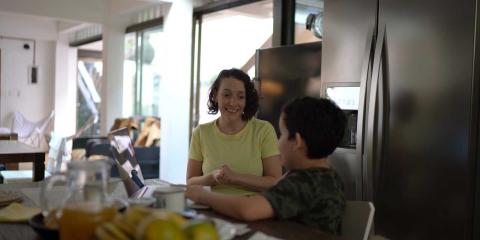Peer pressure is when your child feels pressured into doing something by their friends that they wouldn’t usually do, so they fit in. Peer pressure isn’t always a bad thing – for example, they may end up eating vegetables because their friend likes them, or joining a school club, reading a book or listening to music that a friend recommends.
But unfortunately peer pressure can also be negative, and can lead to children daring each other to do dangerous things like skipping school, shoplifting, smoking, drinking alcohol or taking drugs. So it’s a good idea to help your child learn how to stand up for themselves when they’re little, so they’ll be more resistant to peer pressure as they grow up.
Tips for helping children stand up to peer pressure
Here are some tips to help them stand up to peer pressure. The Childline website has advice for your child on dealing with peer pressure, and the Parenting Smart website has suggestions for what to do if your child gives in to negative peer pressure and is then upset about it.
Tip #1: Talk to them and listen
If your child feels they can be honest with you and that you respect their opinions, they’re more likely to expect this from their friends too. Respecting their opinion doesn’t mean always letting them have their own way (no matter what they think about brushing their teeth, they still have to do it!) But it can mean having a discussion about things (like why toothbrushing is so important) and giving them some choice (like what toothpaste they use). Our page on making daily life easier has more tips for giving children choice.
Tip #2: Help them be more assertive
Assertiveness means being able to explain what you feel and what you need from someone without being rude or aggressive. Many adults find it hard to be assertive sometimes, so helping your child learn this key skill when they’re little will be super helpful as they grow up.
If your child’s worried about standing up for themselves, you could help them practise what to say to their friends. For example, if their friends want to do something that they don’t, they could practise explaining why they don’t want to do it.
Being assertive will also help them at school – so for example you could practise asking their teacher a question in class.
You could also try reading this page on Childline about being assertive.
Tip #3: Encourage them to think through the consequences of their actions
This is something you can practise when reading a book or watching TV together. Try talking about the different characters’ actions and what happens as a result, to help your child realise how one action leads to another.
Tip #4: Help them keep calm
If your child understands how to keep calm, this will help them make better decisions, so they're less likely to get pushed into things they don’t want to do. You’ll find lots of ideas and exercises for keeping calm on our page on supporting your child’s mental health.
Tip #5: Help them build their confidence
The more confident they are about their own decisions and abilities, the less hard it will be for them to stand up to peer pressure. Our pages on helping your child feel confident and secure and building your child’s confidence have advice on how to do this.
 Activities & Play
Activities & Play Behaviour
Behaviour Childcare
Childcare Development & Growing Up
Development & Growing Up Family, Friends & Relationships
Family, Friends & Relationships Feeding Your Baby
Feeding Your Baby Food & Eating
Food & Eating Health & Safety
Health & Safety Mental Health & Wellbeing
Mental Health & Wellbeing Money & Work
Money & Work Online Behaviour & Safety
Online Behaviour & Safety Pregnancy & First Days
Pregnancy & First Days School & Education
School & Education Sleep
Sleep









 Mental Health & Wellbeing
Mental Health & Wellbeing
 School & Education
School & Education